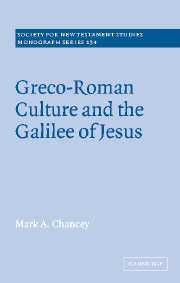Book contents
- Frontmatter
- Contents
- Preface
- Abbreviations
- Map of Galilee and northern Palestine
- Introduction
- 1 Galilee's early encounter with Hellenism
- 2 The Roman army in Palestine
- 3 The introduction of Greco-Roman architecture
- 4 The transformation of the landscape in the second and third centuries CE
- 5 The use of Greek in Jesus' Galilee
- 6 The coinage of Galilee
- 7 Greco-Roman art and the shifting limits of acceptability
- 8 Conclusion
- Appendix: Galilean names in the first century CE
- Select bibliography
- Index of passages
- Selective index of places
- Index of people and topics
5 - The use of Greek in Jesus' Galilee
Published online by Cambridge University Press: 22 September 2009
- Frontmatter
- Contents
- Preface
- Abbreviations
- Map of Galilee and northern Palestine
- Introduction
- 1 Galilee's early encounter with Hellenism
- 2 The Roman army in Palestine
- 3 The introduction of Greco-Roman architecture
- 4 The transformation of the landscape in the second and third centuries CE
- 5 The use of Greek in Jesus' Galilee
- 6 The coinage of Galilee
- 7 Greco-Roman art and the shifting limits of acceptability
- 8 Conclusion
- Appendix: Galilean names in the first century CE
- Select bibliography
- Index of passages
- Selective index of places
- Index of people and topics
Summary
A key component of the view that Galilee was thoroughly Hellenized is the belief that Greek was widely spoken. Proponents of this position cite several arguments for support: centuries of exposure to Hellenism; the growing urbanization of the area from Antipas onwards; the rabbis' use of Greek; the occurrence of Greek names; and, most importantly, epigraphic evidence. At times, the logic of these discussions appears circular: we know Galilee was Hellenized because Greek was spoken there; we know Greek was often spoken because Galilee was extensively Hellenized.
The idea that many Galileans knew Greek is hardly new. Adolf van Harnack and Shirley Jackson Case held it decades ago, and a long series of essays in The Expository Times, many titled “Did Jesus Speak Greek?”, sparred over the issue in the 1950s. What is new, however, is the extent to which the case is believed to have been settled. We can now be confident, it is sometimes claimed, that Greek was used frequently, not only among the elites but also among many of the common people, not only in the cities but also in the countryside. Jesus himself, in this view, may have been fairly conversant in Greek, introducing the possibility that the occasional gospel passage preserves his actual words, rather than a translation from the Aramaic.
This confidence is all the more surprising given that we have no extant first-century texts of proven Galilean provenance.
- Type
- Chapter
- Information
- Greco-Roman Culture and the Galilee of Jesus , pp. 122 - 165Publisher: Cambridge University PressPrint publication year: 2005



